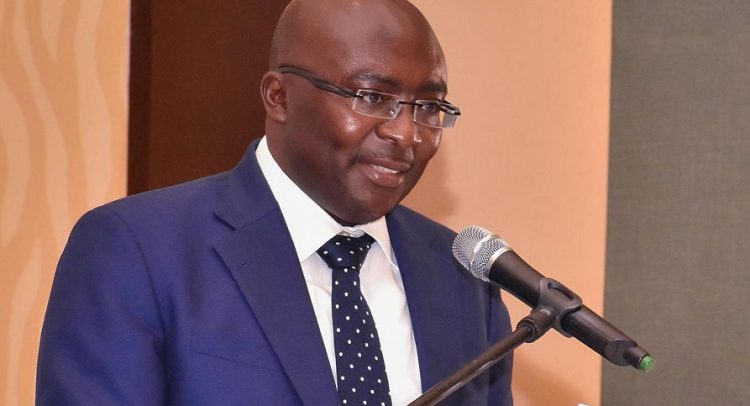Vice President Dr Mahamudu Bawumia
Vice President Dr Mahamudu Bawumia has described as second to none the performance of the Nana Addo Dankwa Akufo-Addo led government in the management of Ghana’s currency, the cedi, as against its major trading currencies, particularly the United States (US) dollar.
His response follows a recent tweet by former President John Mahama in an attempt to ridicule the ruling government and Dr Bawumia in what he (Mr Mahama) described as a depreciating currency caused by weak economic fundamentals.
On his Facebook wall, the Economist and former Deputy Governor of the Bank of Ghana, Dr Bawumia, indicated that such uninformed comments by Mr Mahama only exposed his lack of understanding on key aspects of the economy.
“It has been brought to my attention that former President Mahama has recently been talking about exchange rate depreciation. The former President’s comments, once again, sadly demonstrate his lack of understanding on key aspects of our economy,” Dr Bawumia observed.
Basic lessons
The Vice-President, in the post, took Mr Mahama through some basic lessons on how to assess the performance of a government as far as the exchange rate market is concerned to help guide him in future assessments.
“I understand the difficulty of the former President in appreciating the currency depreciation debate. I would try to simplify the explanation for him,” Dr Bawumia indicated and stated that: “The data on the performance of the cedi over the years show that the cedi is recording one of its best performances in the Fourth Republic under President Akufo-Addo. The depreciation of the cedi against the US dollar is one of the lowest in the first year of any government since 1993.”
He supported his assertion with hard core facts and data from the Bank of Ghana in the form of infographics which showed that the lower depreciation (4.9 per cent) of the cedi against the dollar recorded under this government in 2017 is the lowest year-on-year depreciation recorded in the first year of any new president since 1992, beating the 35 per cent,five per cent, 15per cent, and 14.5per cent rates of depreciation recorded by Presidents Rawlings (1993), Kufuor (2001), Mills (2009), and Mahama (2013), respectively.
Touting the high records of the New Patriotic Party (NPP) over the National Democratic Congress (NDC) in terms of the management of the cedi, Dr Bawumia further revealed that: “An equally instructive fact to note is that the NPP has demonstrated to be by far better managers of the cedi than the NDC. In the entire eight years of President Kufuor’s (NPP) rule from 2001 to 2008, the price of the cedi relative to the dollar moved from GH¢0.7 to GH¢1.2, representing a depreciation of 72 per cent.
However, in the eight years of both Presidents Mills and Mahama (NDC) from 2009 to 2016, the cedi depreciated by 247 per cent, moving from GH¢1.2 to GH¢4.2. Such higher rate of depreciation in less than a decade is simply unacceptable and signifies high levels of incompetence.”
The Vice-President was quick to add that the future held significant prospects for the cedi under the leadership of President Akufo-Addo.
Stronger optimism
“Although it is early days, there is much optimism for a stronger currency under the leadership of President Akufo-Addo. Converse to the first 18 months of many governments in which the cedi depreciated by more than 10 per cent, the first 18 months of this government has recorded a marginal depreciation of seven per cent,” he said.
In sharp contrast to what Mr Mahama had sought to impugn as Ghana’s economy characterised by weak fundamentals; hence the declining value of the cedi, Dr Bawumia recounted that: “The reason for our relatively strong exchange rate performance is that our economic fundamentals (which Mr Mahama sought to question) under President Akufo-Addo are strong, much stronger than the mess he left us. The deficit is lower, inflation is single digit, the debt-to-GDP ratio is declining, interest rates are declining, our foreign exchange reserves are healthy, business confidence is rising and economic growth is increasing.”
-Graphic.com.gh


